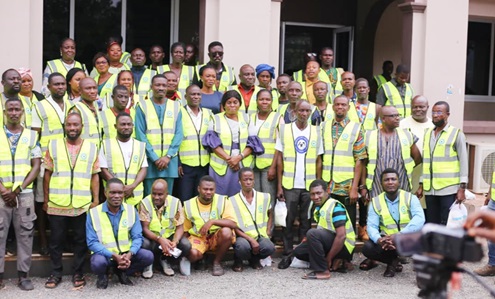The Shai-Osudoku District Assembly (SODA) in the Greater Accra Region has held a stakeholders’ engagement to deal with the issue of sanitation in the area.
The participants included both the unit committee and the assembly members in the district.
At the end of the meeting, a nine-member sanitation management steering committee was formed and charged to ensure effective monitoring of sanitation activities in all the electoral areas.
The members included Ignatius Godfred Dordoe, who is the District Chief Executive, chairman; Agnes Korletey, secretary (District Environmental Health Officer); Francis Agbo, (District Engineer) and Nicholas Korletey Owen (Presiding Member, SODA).
The rest are Saviour Kweku Animle, Clement Djangma and Abiba Mbilla.
Task force
In an address, Mr Dordoe said as the political leader of the SODA, sanitation was one of the key areas he had on his plans as part of the reset agenda to keep the environment clean.
He said based on that, he had decided to put the unit committee members together as a task force to supervise sanitation work in the various electoral areas.
In the same way, the eight-member steering committee on sanitation would be monitoring and supervising the performance of the various electoral areas.
“As I have announced earlier, I, as the DCE, have instituted a personal award of GH¢ 5,000.00 to the best performing electoral area in sanitation.
The nine-member steering committee will look at the award, categorise them, evaluate the sanitation work they are doing and award it to the deserving electoral body that will win the prize”, he emphasised.
Mr Dordoe said the unit committee members were the backbone of the local governance system and urged them to return to their respective electoral areas and begin mobilising efforts for the sanitation work immediately, stressing “that is what you are supposed to do and the assembly will also support you fully to perform”.
Work
The DCE said the work of the unit committee was all about their empowerment and because of that, they felt neglected.
He said as a result, he spoke with all the assembly members, who serve as heads of the various electoral areas, to work in collaboration with the unit committee members. He assured them that his doors were always open to anyone with concerns, and encouraged them not to hesitate to approach him for discussions in the interest of the district."
“I want to caution that the unit committee is not a political position because all the political parties such as the Convention People’s Party, National Democratic Congress, New Patriotic Party and all others are in the communities and so if you become too political, mobilising them will be very difficult for you. So, you need to be neutral so that you can bring everybody on board to champion the development of the electoral areas,” the DCE advised.
Mr Dordoe stated that in the old system, there were sweepers recruited by the assembly who were on salaries.
In a similar manner, he explained that SODA had decided that for sanitation contracts awarded by the assembly, unit committee members would be recruited as employees and supervisors, allowing them to receive stipends from that arrangement.
Furthermore, the assembly would ensure that in every quarter of the year, it would provide them with something to support the sanitation work to serve as motivation to perform the basic task at the basic levels.
Communities
The DCE, therefore, urged all the communities to be concerned and participate in cleaning the environment, adding that “a safe environment is equal to good health’’.
The DCE hinted that very soon, SODA would bring back the Environmental Officers who were popularly known as “samasama” to the communities to enforce sanitation byelaws as it used to be.
For her part, Ms Korletey said the effort of the district environmental health and the assembly, for that matter, failed as a result of poor attendance and lackadaisical attitude of the community members.
He expressed the hope that things would be better going forward and with the new wave of change.
At the meeting, the stakeholders, especially the unit committee members, mentioned a number of challenges they were facing including non-recognition by the assembly as part of the local governance system and called for reorientation of their position to promote good governance in the district.
SODA is made up of 22 electoral areas and six zonal centres.
The electoral areas are Agortor, Osuwem, Tokpo, Agbekotsekpo, Dorfor, Adakope, Asutsuare, Kadjanya, Natriku, Agomeda and Luom.
The rest include Lorlorvor, Asutsuare Junction, Wedokum, Ayikuma, Odumsey, Kutuwe, Abierter, Adaam, Aperko, Salem and Akorkuanor.

